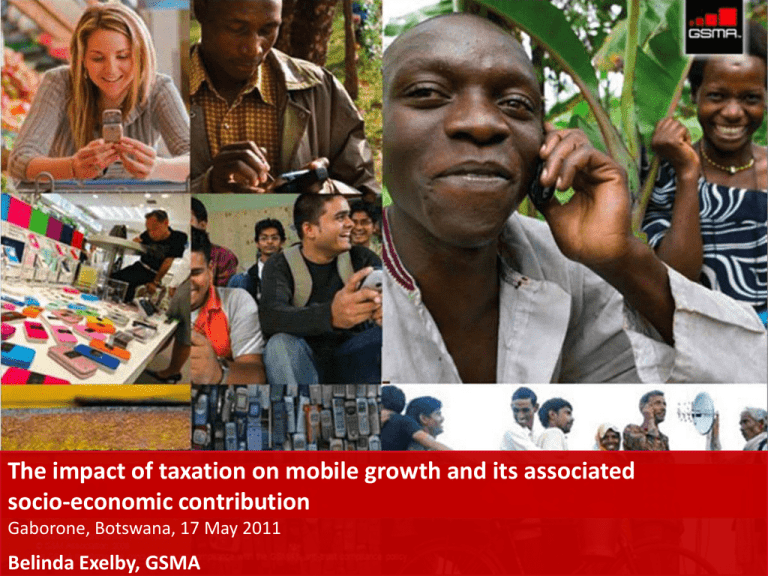The impact of taxation on mobile growth and its associated
advertisement

The impact of taxation on mobile growth and its associated socio-economic contribution Gaborone, Botswana, 17 May 2011 Restricted - Confidential Information © GSM Association 2010 All GSMA meetings are conducted in full compliance with the GSMA’s anti-trust compliance policy Belinda Exelby, GSMA Taxing times The recession has led to decreases in tax revenue around the world, meaning governments are faced with challenging decisions on tax policy The temptation to impose disproportionately high taxes on the mobile sector is strong Types of mobile sector-specific tax currently levied by some governments in developing countries include: Specific excise duties (“luxury taxes”) on mobile handsets Luxury taxes on mobile usage (airtime) Luxury taxes on ICT equipment SIM activation charges Surtaxes on international incoming traffic © GSM Association 2011 The Dilemma Higher tax revenues in the short term, or… …longer-term rise in mobile ownership and use, stimulating economic growth and ultimately increasing total tax take © GSM Association 2011 Impact on Affordability Luxury taxes drive up the total cost of ownership (TCO) of mobile services, making them less affordable, especially for the poorest consumers GSMA research has found that an average of 17.4% of mobile TCO (globally) is formed of consumer and import taxes* Increased TCO restricts take-up of mobile phones hampers achievement of universal access goals limits long-term value creation potential of the industry Taxes on handsets and devices delay upgrading of equipment, which has negative effects on the spread of new and higher quality services Surtaxes on international incoming traffic reduce competition and create artificial inflation in international calling prices *Deloitte: Global Mobile Tax Review 2007 © GSM Association 2011 Case Study: Pakistan Pakistan’s cellular industry has long been highly taxed; strong contributing factor in decline in the growth of mobile Multiple stakeholders worked together since 2006: Regulator (PTA) Ministry of Information Technology Ministry of Finance Federal Board of Revenue Mobile Industry Media Activation tax reduced from PKR 2000 to PKR 250 Federal Excise Duty reduced from 21% to 19.5% Result: Higher mobile penetration Increased investment in network by operators resulting in higher foreign direct investment for the country Long-term increase in overall sustainable tax revenue © GSM Association 2011 Affordability of Mobile Broadband In Africa mobile is the driver for broadband penetration Taxation policies for mobile broadband need to align with national ICT objectives; encourage growth of the nascent market Broadband devices (and network roll-outs at eg 2.6GHz) are more expensive than voice; additional tax burdens will have even greater impact on penetration levels than with voice GSMA research (2010)* found that at least 27 countries worldwide have adopted highly distorting tax approaches that will negatively impact growth of mobile broadband *Source: Impact of Taxation on the Development of the Mobile © GSM Association 2011 Broadband Sector in Emerging Countries, GSMA, July 2010 Case Study: Malaysia Striving to achieve a broadband penetration target of 60% by the end of 2011, the government of Malaysia has minimised taxes on both handsets and usage Taxes represent only 6.1% of mobile TCO VAT is charged at 5% on usage and 10% on handsets (handheld products such as PDAs are exempt) There are no mobile-specific taxes or import duties on handsets By mid-February this year the broadband penetration rate had reached 57.1% Source: Impact of Taxation on the Development of the Mobile © GSM Association 2011 Broadband Sector in Emerging Countries, GSMA, July 2010 Taxation Structure Impacts Mobile Penetration Estimated percentage increase in mobile penetration resulting from changes in taxation Estimated percentage increase in mobile user base resulting from changes in taxation Reduction of 1% of tax on TCO Reduction of 1% of tax on TCO Reduction of tax to benchmark rate (6.1%) Reduction of tax to benchmark rate (6.1%) Note: Malaysia is considered to be the benchmark at 6.1% Source: Impact of Taxation on the Development of the Mobile Broadband Sector in Emerging Countries, GSMA, July 2010 © GSM Association 2011 Impact on the Economy Luxury taxes are a barrier to increased mobile penetration and the economic growth that results: A 10% increase in mobile penetration boosts GDP by 1.2% 1 A 10% increase in broadband penetration boosts GDP by 1.3 2 Countries with 80% broadband penetration are more than twice as innovative as countries with 40% penetration 3 Increasing broadband penetration by 10% translates into a 1.5% increase in a country’s labour productivity 3 International surtaxes negatively affect international competitiveness, driving up the cost of doing business in Africa For families with members living abroad, the increased cost of calling home means less money available for remittance to the home country (and into the local economy) Sources: 1. Deloitte for the GSMA report : Global Mobile Tax Review 2006-07 2. World Bank, Qiang 2009 3. © Booz & Association Company, Enabling Sustainable Digital Highways; Strategies for Next-Generation Broadband GSM 2011 Recommendations • The GSMA recommends that governments recognise the following when formulating their national tax policies: Mobile phones and mobile broadband boost GDP, create jobs and are a vital part of the socio-economic landscape in Africa Taxing mobile devices and services as a luxury is no longer appropriate and directly hampers achievement of the MDGs Surtaxes on international incoming traffic are harmful to both consumers and operators and are ultimately counterproductive for governments Taking a short-term view and applying punitive sector-specific taxes is likely to be counter-productive for all in the long term © GSM Association 2010 THANK YOU For more information: www.gsmworld.com/publicpolicy Restricted - Confidential Information © GSM Association 2007 Confidential All GSMA meetings are conducted in full compliance with the GSMA’s anti-trust compliance policy 11 Back-up slides © GSM Association 2010 Your input to us? © GSM Association 2010 Impact on the Economy (cont.) Illustration: GSMA research in East Africa, published 2009, found that typical contribution of the mobile industry was between 4.7% and 6.0% of GDP 7.0% 6.0% 5.0% 4.0% 3.0% 2.0% 1.0% 0.0% Tanzania Uganda Supply side and productivity increases Kenya Rwanda Intangible benefits Likely effects of reducing or eliminating luxury taxes: Initial fall in tax revenues from mobile services Subsequent uplift from indirect effects (increased corporate tax and regulatory fees) Significant long-term uplift based on GDP and national economic multiplier impacts Sources: GSMA & Deloitte “Taxation and the Growth of mobile in East Africa” 2009 © GSM Association 2011 Agenda Mobile sector-specific taxes Impact on affordability of mobile Case study: Pakistan Affordability of broadband Case study: Malaysia Impact on the economy Recommendations © GSM Association 2011
